[M]y piece was partly inspired by Plato’s Allegory of The Cave
Tope Folarin’s story “Miracle” published in Transition is on the shortlist of the Caine Prize for African Fiction. I caught up with Folarin via email and asked him a set of questions about himself and his work. His responses are illuminating and fun to read.

Tope, could you please tell us a little bit about yourself? What part of Nigeria are you from? What was it like growing up in America as the child of Nigerian parents?
Your second question has been the cause of some anxiety for me throughout my life, for it is a question that is concerned with identity. The short answer—the honest answer—is that I was born in America. My parents, however, were born and bred in Nigeria. My father is Yoruba, and he is from Abeokuta. My mother is Igbo, and she is from Lagos.
Growing up in America as the child of Nigerian parents was a difficult, isolating and ultimately beneficial experience. I spent my early years in Utah, so for much of my childhood I was unaware of the distinction between African-American and Nigerian. In Utah, black was black. So my initial understanding of race was one of opposition, of dislocation, of exile from the norm. At first I didn’t even know I was black, or at least ‘black’ as it is defined in American society. I had no conception of my difference. Once I learned that I was, indeed, different from everyone else, I was traumatized. In retrospect, I realize that I spent much of my life afterwards attempting to return to that feeling of security and knowing I possessed before I realized who I was in relation to others.
Can you reflect a bit on winning a Rhodes Scholarship and on studying in the UK.
The Rhodes Scholarship changed my life. Completely.
But allow me to backtrack. When I enrolled at Morehouse College (where I received my undergraduate degree), I was determined to do as well academically as I could. I’d never really pushed myself before, and I suddenly had the feeling that my life was slipping away from me. An odd thing to feel as an eighteen-year-old, I know. Nonetheless, I realized that college represented a chance for me to fundamentally remake myself, and I decided to do so.
So on my first day at Morehouse, I sat at my desk and wrote down ten goals I would achieve by the time I graduated. Winning a Rhodes was at the top of that list. I took out another sheet of paper and wrote down the ten things I’d have to give up in order to achieve my ten goals. Reading novels was at the top of that list.
You have to understand, my parents had always taught me that the act of reading fiction was simply a luxury I could not afford. Reading novels was what rich kids did, because their parents could subsidize their education. Reading fiction was what the lazy kids did, because they had nothing better to do than fill their heads with stories. At Morehouse, I associated fiction with my carefree high school years, and I decided that I’d have to turn away from childish things if I wanted to achieve something.
Three years later I won the Rhodes. The Rhodes meant freedom. I’d already proven I could excel academically. Now came the important question: what did I want to do with my life?
How did you come to writing? How did your relationship to text (reading and writing) evolve? In an interview you said that when you were growing up your dad was not really keen on your reading fiction. He wanted you to read biographies and non-fiction. Did that in any way affect your decision to become a fiction writer? What does your father think of your work now and your success as a fiction writer?
Two important things happened to me at Oxford. First, I almost immediately realized how uneducated I was. Though I knew a great deal about the topics I’d studied in college—political science, English, foreign policy and the like—I didn’t know anything about art—painting, poetry, or contemporary fiction. Yes, I read a great deal of fiction before college, but I read mostly science fiction and fantasy. And I did read some literary fiction in college, but mostly the classics: Things Fall Apart, Go Tell it On the Mountain, Slaughterhouse Five…nothing written after 1980. So if my classmates struck up a conversation about Ray Bradbury or Ursula K. Le Guin or James Baldwin, I was in comfortable territory. If they struck up a conversation about Philip Roth’s latest novel, or Zadie Smith’s, or the new Picasso exhibit at the Met, however, I was lost. I quickly realized I’d have to start studying again.
The second important thing that happened was that I met a few people who were artists and scholars. Folks my age who had excelled academically at their schools and written plays and short stories and composed albums at the same time. Their very presence granted me permission—before I even knew I was seeking permission—to be the person I’d always wanted to be.
I read exhaustively at Oxford. First I read all the novels my friends had been talking about, then I read about the writers of those novels, then I read the novels these writers mentioned in their interviews, and so on. By the end of my first year I felt that I had caught up, in a way. During my second year I decided to limit myself to reading first novels by great writers. At the time I convinced myself that I was merely continuing my cultural education. Now I realize that I was preparing myself to become a writer.
My father has been quite supportive. He hasn’t read much of my work yet, but I can’t wait to press my book into his hand one day.
Is “Miracle” your first published piece? Transition is such a wonderful journal. How does it feel to be associated with it?
Miracle” is the first short story I’ve published, though I’ve published some non-fiction in the past.
I first heard of Transition when I was at Morehouse. I came across the Transition archive on JSTOR, the digital library of academic journals and magazines, while I doing some research for a paper. I was shocked that I’d never heard of Transition, especially considering the fact that many of my favorite thinkers—Wole Soyinka, Chinua Achebe, bell hooks, Stephen Carter, Kwame Appiah, Christopher Hitchens—had written for the magazine.
As I read more about Transition, I became intrigued by its historical trajectory. I learned that Transition was born in Africa, that Soyinka himself had edited it for a time, and that it served as an important meeting space for Africa’s great intellectuals. I learned that the magazine had a dormant period, and that it was resurrected by Henry Louis Gates Jr. as the flagship publication of the Dubois Institute at Harvard.
Ultimately, I sent “Miracle” to Transition because I felt that my family’s trajectory mirrored the magazine’s, and that the editors would appreciate my fiction, situated as it is in that uncomfortable space between home and abroad. Needless to say I was ecstatic when they decided to publish it.
Your twitter page is flooded with congratulatory messages. What has the experience of being shortlisted for such a prestigious award been like?
It has been a truly unbelievable experience. Above I mentioned my childhood anxiety about identity—when I began to think about submitting “Miracle” to the competition, I found myself grappling with insecurities I thought I had long buried. But now instead of wondering “am I black enough,” I wondered “am I African enough”? I wondered if my work would be taken seriously, if it would even be understood, since it is solidly—defiantly, even—situated in the diaspora. I cannot tell you how gratifying it feels that the Caine Prize judges took my work seriously, that they understood what I was trying to say, and that they decided to place my story on the shortlist.
Let’s talk about “Miracle.” Is the story biographical in any way?
Not particularly. Have I participated in my fair share of miracle healing services? Yes. Was there even a moment when I might have done what the young boy does in my story, when I ‘performed’ a miracle for the benefit of the congregation? Yes. This incident, however, merely serves as the germ of a story that has its own concerns and aspirations, separate from this comic episode in my own life.
At home and abroad Nigerians tend to organize their lives around the belief in divine intervention. Is your story a criticism of this world view?
No—my story is not a criticism of this worldview at all. My story is more concerned with the performative aspects of Christianity, and how these aspects—especially in the diasporic context— invariably have more to do with economics, culture and community-building than anything else.
Or perhaps I should merely say that I wanted to do two things in “Miracle”; first I wanted to tell a story about the diaspora, and second I wanted to tell a story about community-building.
The story begins with a first-person plural voice—‘we’—because I wanted to convey how the hopes and desires of a diasporic grouping intersect within a religious ceremony. Religious ceremonies can be quite intimate, especially when all participants have similar desires or, alternatively, when everyone is scared of the same thing. The voice implies unanimity. Even difference is subsumed into the voice, difference becomes merely another feature of a single collective experience.
We’ve all had first-person plural experiences. Think about that concert you attended when you were screaming at the top of your lungs, like everyone around you, imploring your favorite singer to play your favorite song again and again. Or that political rally when a tear trickled down your eye as your would-be leader insisted that yes, we can.
The thing that intrigues me most about these first-person plural experiences is that they are (typically) temporary, and yet they derive their potency from their temporariness. Also, we act differently when we are a part of the ‘we’ than we do otherwise. Also, it is so easy to assume the personality of the ‘we,’ to disguise yourself in it, especially if you aren’t sure who you are outside of the crowd.
In my story the prophet reminds the congregation of the importance of faith, and he reminds them of their shared experiences. He’s trying his best to build a community, to remind these people that although they’ve made it to America they still have yet to complete the race. He’s trying to remind them that they’re in this together.
And then the shift in the story—the prophet calls someone out, a person who has been hiding in the shadows of the ‘we’.
When the young boy is separated from this diasporic experience, when he is ejected from the cocoon, he is disoriented, lost. He has lost his identity as a member of the whole. He has lost the belief he possessed as a member of the crowd (in the text I refer to his religious status as ‘unbelief’ and not ‘non-belief’). He begins a dialogue with the prophet that is separate from what is happening in the congregation.
This shift is important because the prophet is trying to teach the young boy a private lesson in a public space. The prophet—whether by spiritual means or otherwise—has ascertained that he shares many traits with the boy. They are both short. They both have breathing problems. And, most importantly, they both have faulty vision.
And yet the prophet has the ability to see what the congregants need in order to continue their lives. He’s trying to trying to show the young boy the same.
If I was being honest with you, then I’d tell you that this section of my piece was partly inspired by Plato’s Allegory of The Cave. It’s a well-known allegory—one I won’t recount in full here because I’ve already gone on too long—but, in short, in The Republic, Socrates describes a scenario in which a group of people are chained to a wall in a cave. Their entire reality is made up of the shadows that play across the wall before them. Then Socrates asks us to imagine what would happen if one of the prisoners somehow escaped the cave and saw, for the first time, the world for what it actually is. Socrates argues that the prisoner, upon returning to the cave, would no longer be satisfied with the false reality that is presented in the cave, and that the other prisoners would dismiss the knowledge that he brings back with him. In my story, the type of miracles that the congregants are praying for—new kidneys, new lungs, new limbs, new hearts —are similar to the shadows playing across the wall. They are, in a way, a kind of performance.
I’ve often wondered about the fate of those people trapped in the cave. What provides them with hope amid the darkness? The answer is simple: the shadows. And what, if anything, would prepare them for the knowledge that their colleague brings with him from beyond the cave? I suspect the answer is the same. Where my story deviates from Plato’s is that I am gently asserting that both spectacles—the shadows on the wall and the reality outside the cave—are essential. I’m arguing that the shadows and reality complement each other.
The prophet—another word for prophet, of course, is ‘seer’— wants the child to participate in the performance of the miracle, to help him create shadows, but he also wants the child to see with his ‘spiritual eyes’. He wants the boy to escape from the cave, to attain a higher knowledge.
The higher knowledge in this case—and perhaps this is where my story deviates completely from Plato’s— is that the congregation needs the miracle more than they need the truth. The performance of the miracle will confirm their faith, and enable them to continue the dreary work of building their lives in America. And because the young boy comes to recognize the importance of the miracle service to the morale of the congregation, he completes the performance for their benefit.
Of course, the boy attains another kind of ‘higher knowledge’ as a result of his participation in the miracle service—he comes to understand that he has lived a miracle-filled life. He realizes that there are miracles all around him (I should also note that he receives this knowledge when his physical eyes are closed; when he is, in effect, blind). This knowledge is confirmed at the end when his eyesight miraculously returns when he puts on his glasses.
There seems to be different miracles taking place all at the same time—the miracle that the man of god imagines he is performing, the miracle that the congregation imagine they are seeing take place, and the boys sense of miracle at the very end. Is any one sense of the miraculous more authentic that the others?
No. All of these miracles are important. As I’ve explained above, in my vision of the story, the prophet is more concerned with the performance of miracles than the actual thing. If a miracle actually occurs, all the better. This is why the young boy plays such an essential role in the story—he is perhaps the only person present who has never been to a miracle ceremony. He has no idea how these services are supposed to play out. So his struggle with the prophet—his refusal to fall when the prophet touches him—is an externalization of the struggle that any new adherent to a particular faith must face. The struggle towards conversion.
The name of the principal character is never revealed. Is this just a minor narrative quirk or are you trying to accomplish something by keeping the character anonymous?
In your review of my story you captured something important—there is a moment in the story where the ‘we’ becomes an ‘I’ via a ‘you’. In this moment, when the prophet is pointing at a member of the congregation and asking ‘you’ to come up here, I’m trying to prod the reader as well. I’m asking the reader—you—to participate in the story. I assumed it would be easier for me to achieve this—to somehow collapse the distance between the reader and the text—if I refrained from naming the character.
The story is about miracles but it also about dreams. Is there a relationship between dreams and miracles?
Yes! Dreams are the doorways to our miracles. It is almost impossible to achieve a miracle—like making it to America, or designing a device that will enable a near-sighted person to see clearly—without dreaming about it first.
Would you say that the African immigrant experience is one that oscillates between dreams (that never come true) and miracles (that never happen)?
I’d agree with you that the immigrant experience does oscillate between dreams and miracles. If you accept my formulation above, then you could even say that miracles cannot happen without dreams. However, I also know that all of us experience miracles every day. We’ve just forgotten what they look like.
America is often imagined as the land of dreams, a place where people go to fulfill dreams of making money, getting an education, raising a family, and helping relatives back at home. Tons of writers have written stories complicating this grand narrative of America as a place where dreams come true. What makes yours different?
I’d say that my story is less concerned with particularizing the African immigrant experience. In other words, I’m not interested in asserting that the experiences that African immigrants face differ dramatically from what anyone else might face. I believe people are drawn to immigrant narratives because they recognize their lives—amplified, dramatized—in such stories. My fiction is less interested in America as a specific destination on a map and more as a spiritual destination. America could be anywhere, has been everywhere. I hope to remind people that we are all immigrants.
One thing your story shares with Abubakar Ibrahim’s story is the question of disability. I found this particularly striking since disability is something that is not widely talked about in Nigerian societies. In your story, the old miracle worker criticizes what he sees as an American misconception of disability: “People accept that they are damaged in some fashion, and instead of asking God to intervene, they accept the fact that they are broken!” A similar assumption seems to be at work in Ibrahim’s story when the mother of the principal character tells him that it is in his power to decide whether his misfortune—his blindness—would be a tragedy or not. Is the message here truly uplifting or is it denying the very possibility of disability? What if someone truly has been damaged, traumatized, broken? Is the condition of being broken something that we can wish away by simply refusing to accept it?
This is a fascinating question. I quite enjoyed reading Abubakar’s story, but I didn’t see this similarity until you pointed it out. You are right—both of our stories feature somewhat similar themes—blindness, disability and the like.
In my story, the prophet is trying his best to build community. He’s trying to convince the congregants that they are special, that they are the true keepers of the faith. He’s telling them that Americans have lost their faith, or at least have become lazy in their faith. In this context, the prophet’s statements are less about disability per se; his statements are part of a grander narrative. The prophet is trying to convince these Nigerians that they deserve America more than the Americans do.
Though I have my own interpretations of Abubakar’s story, though I’m quite tempted to discuss what I think Abubakar might be saying in his story, it’s probably best that I refrain until I’ve had a chance to speak with him.
“Miracle” is part of a larger project called The Proximity of Distance. This is a novel right? What is it about? When does it come out? Who is publishing it?
My book is a novel in stories. It’s basically a bildungsroman, with an intense focus on identity-formation. Thus far, I’ve spent more time composing the novel than thinking about publication. Now that I’ve completed it, though, I’m looking forward to the next step.
Of the five finalists, you are the only one not born in an African country. You are a first generation (Nigerian) American who has been shortlisted for an African literary award. Does your situation complicate or add something interesting to the long-running (admittedly tiring) debate about how we define an African writer?
Back when I was at Oxford, musing about the kind of novel that I’d like to write some day, I always believed that I’d have to hold off on writing anything until I’d spent a significant time in Nigeria. I believed that I wouldn’t be able to write the kind of novel I wished to write if I didn’t spend some time with my family, acquainting myself with the towns where they grew up and became adults. Even if my novel didn’t feature some dramatic homecoming scene, the young man crying into the bosom of his grandmother after decades away, say, I felt that my book would be incomplete somehow if I didn’t go back.
When I finally started writing, though, I realized how essential my ‘incomplete’ perspective was. As a Nigerian-American, a diasporic African, my entire experience of Nigeria is essentially an accumulation of these discreet, intense moments when the ‘authentic’ Nigerians in my life—usually adults, usually my elders—are engaged in the act of recreating Nigeria. Whether these moments are intimate in scale (a friend of my father’s stops by, my father dusts off the old Sunny Ade record, my mother prepares jollof rice, they all laugh and shout into the night) or much grander (parties, weddings, funerals, church) these moments are suffused with a deep sense of longing, of happiness, of hope. Too, since most of my life as an American is defined by what is present, what is instantly accessible, I’ve always been struck by the extent to which my diasporic moments are defined by absence. The long-lost cousin. The unaccomplished dream.
I realized my writing could inhabit these absences.
I think I bring an important perspective as one who has not spent a significant amount of time in Africa. My experience of Africa has been like those shadows on the wall—the reflection of something real, and vibrant, and untouchable. But those shadows are important because they demonstrate how the real experience has been reflected, how those experiences might appear to others who have no access to the real.
There are many of us who have spent our entire lives in the diaspora. I want to write for us.
All the other stories shortlisted are lovely. Is there anyone that you find most striking? If you had the chance to have a beer or tea with a character from the other stories, which would it be?
Indeed, they are all lovely. Yet another reason I am so pleased to be on the shortlist. I’d very much like to live in these stories for a moment or two. I’d like to spend a couple nights drinking beer with Logan, the star of “Foreign Aid,” or perhaps even become a recipient of the monetary gifts he so freely doles out. I’d like to mentor Dantala, the young protagonist of Elnathan’s story. I’d like to offer some comfort to Salim of “The Whispering Trees” as he experiences one tragedy after another. And I’d be quite pleased if I could sit next to Nnenna on the bus as she rides to the embassy, as she decides whether she wishes to travel to “America” or not.
Which African author from the “old school” do you find most compelling?
A difficult question to answer, of course. But here goes: Soyinka’s plays were very important to me in grad school. I became obsessed with play structure after reading his work—especially ‘Death and the King’s Horseman’ and ‘Jero’s Metamorphosis’. In fact, when I was writing “Miracle” I was reading poetry and plays, not much fiction. Achebe, of course. I read a lot of Nadine Gordimer. I read many of the books in Heinmann’s African Writer Series; the writers I returned to again and again, though, were Bessie Head, Alex La Guma (loved his short stories), and Ousmane Sembene (as a way to contextualize his films). I read Coetzee obsessively. And just about everything Ben Okri has written (though I’d consider him part of the new school)
At the moment we are sort of reeling in a blitz of new novels from contemporary African writers—Adichie’s Americanah, Selasie’s Ghana Must Go, Bulawayo’s We Need New Names, Beukes’ Shinning Girls, and so on. Which contemporary African writer do you admire?
I know! What a wonderful time to be a fan of African fiction. I admire all the writers you list above—for their courage, their language and stories—and a few others besides. Teju Cole writes beautifully. Uwem Akpan writes with a deep understanding of structure. Helon Habila is incredibly talented. Petinah Gappah’s first collection is a must read. I could go on.


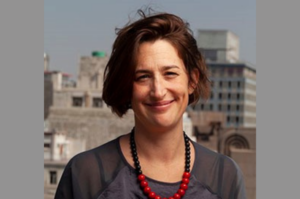
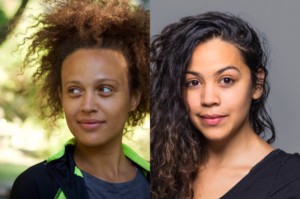
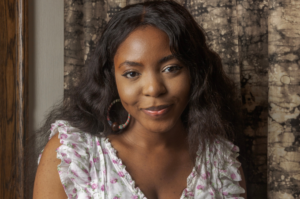
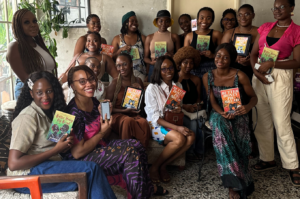
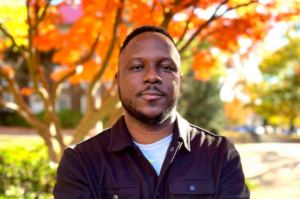
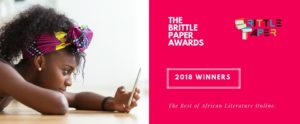

In anticipation of tonight’s announcement by the Caine Prize for African Writing | A Tunanina... October 06, 2013 13:42
[…] “Brittle Paper interviews Caine Prize shortlistee Tope Folarin” 5 June 2013 […]